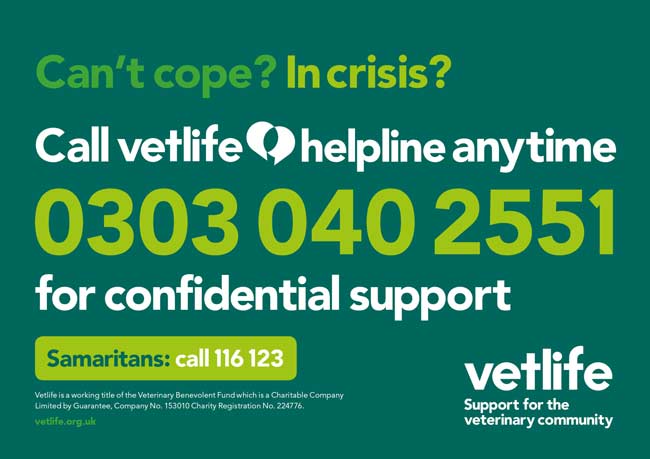Pretty much everyone reading this knows being a vet or veterinary student is stressful.
Veterinary surgeons in the UK are three to four times more likely than the general population to die by suicide (Platt et al, 2010), with stress being a huge factor in such mental health issues.
- 26% of people in the profession suffer anxiety
- 5% suffer clinical depression
- 21% have had a suicidal thought in the past 12 months (Crowe et al, 2016)
These are extremely bleak statistics. But why is being a vet, a dream career for so many, so difficult? And what efforts have been made, or should be made, to tackle this problem?
The cause of stress
Firstly, it’s important to talk about what actually causes stress.
For veterinary students, the jump in volume of information to learn, the competitive nature of the course, the high number of contact hours and the huge workload – as well as the isolation from normal university life – are key factors (McArthur et al, 2008).
For vets, managing the pressures of long hours, completing huge volumes of paperwork, fighting compassion fatigue and issues of physical isolation (on top of trying to maintain some sort of a life outside of work) can prove to be virtually impossible.
In 2018, a study by CM Research, conducted across 18 countries and six continents, found:
- 40% of vets felt the biggest issue facing them was too much work
- 81% had considered leaving the profession for a better work-life balance
- a staggering 95% of vets felt stressed on a day-to-day basis
Safe to say the issue is serious, and prevalent across the profession. So, what is being done to tackle the problem?
Self help

Individual practices are encouraged to make their own improvements to increase the welfare of their employees. However, many of these practices have little money to spare and so are unable to offer time off, counselling, fewer work hours or any other form of stress mitigation.
Various helplines and organisations, such as Vetlife, may be of help to the minority of individuals who actively reach out, but pride, time constraints, denial and anxiety may prevent vets from doing so.
Veterinary schools are increasingly teaching students about stress management. Many offer yoga lessons and “cuddle a therapy dog” sessions, along with practicals, online support and tutorials, in which students are given information on dealing with stress and managing their workload.
These sessions usually cover stress-handling techniques – for example “10 tips for managing stress at vet school” (BVA, 2019), which offers advice such as:
- maintain friendships and interests outside of veterinary school
- do things you enjoy
- keep physically active
Luckily for us, we have an abundance of free time outside of our studies to do all these things.
Oh, wait…
Getting to the root of the problem
Interestingly, none of the aforementioned actions seem to address the actual causes of stress – they merely help us “manage” it. However, it seems pretty obvious a huge proportion of stress is down to: “So much to do, so little time to do it in.”
Although stress management techniques certainly have huge value, if vets and students had enough time out of work to follow the advice we are bombarded with, then surely there wouldn’t be so much of an issue in the first place?
Prevention, not cure
This leads us to ask what actually could be done to prevent stress, rather than just mask it.
As a vet student with zero experience of running a practice, it would be naive of me to suggest simply reducing vets’ workloads. Practices simply cannot afford to employ extra staff to reduce hours for everyone overall – for example, a large increase in prices for clients would be needed to allow better pay/hours.
As well as making things more difficult for pet owners, a large proportion of clients seem to believe vets are all secretly rich, so upping profits would not go down particularly well, and animals might suffer as a result. A change in attitudes towards the profession, brought about by education, would be needed to even begin to tackle issues within the veterinary career.
Do less
As a veterinary student, however, the answer seems pretty clear and more feasible: reduce workload.
How many things are veterinary students taught that will never be used in practice? How many hours of learning are spent to pass an exam, only for you to forget 99% of the information you had so carefully crammed just a week later?
We attend hours upon hours of lectures and tutorials on specific scientific processes, only to be given one sentence at the end “this is relevant to x pathway in y drug action to be used on z disease in w species” (if we’re lucky) to justify the “clinical relevance to our career”.
Then, on top of the hours spent travelling off main university campus, attending double the contact hours of our peers and freezing our bums off in fields, we get the pleasure of mandatory “stress management” practicals. Oh, the irony.
Extra time?
Could we insert the opportunity to intercalate for an extra year should we wish to learn the more advanced biology content (in-depth pharmacology, cell biology, etc) into the programme – and keep the veterinary medicine degree on a need-to-know-for-actual-practice basis?
That’s up to the experts. But, to a student, it seems like a simple change that could have an undeniably huge impact on our lives at university and throughout our careers.


Leave a Reply